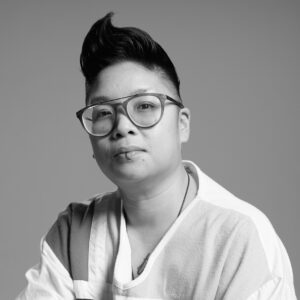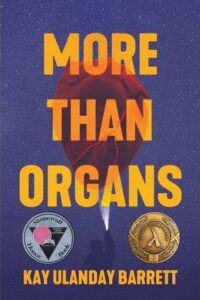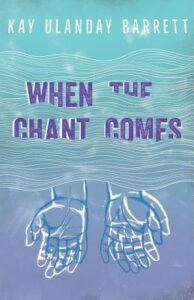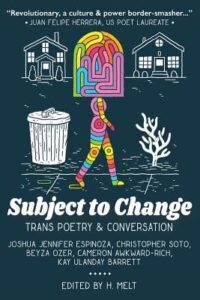Kay Ulanday Barrett
Pantoum for recital when my mom said, don’t let them see you cry
A memory from childhood is viewed through the lens of the Malaysian poetic form of pantoum. New things emerge when lines break and reform with new associations.
We’re pleased to offer Kay Ulanday Barrett’s poem, and invite you to connect with Poetry Unbound throughout this season.

Image by Annisa Hale/ Film processed by Moody's Film Lab, © All Rights Reserved.
Guest

Kay Ulanday Barrett is a poet, essayist, cultural strategist, and A+ napper. They are the winner of the 2022 Foundation for Contemporary Arts Cy Twombly Award for Poetry, a 2022 recipient of a Tin House Next Book residency, and a recipient of a 2020 James Baldwin Fellowship Award at MacDowell. Their second book, More Than Organs (Sibling Rivalry Press, 2020), received a 2021 Stonewall Honor Book Award and is a 2021 Lambda Literary Award Finalist. Their contributions are found in The New York Times, Academy of American Poets, Poetry Magazine, Literary Hub, them, The Advocate, Al Jazeera, NYLON, Vogue, The Rumpus, The Lily, The Maine Review, The Massachusetts Review, and elsewhere. For more information, visit kaybarrett.net or find them on social media at @brownroundboi.
Transcript
Transcription by Alletta Cooper
[music: “Praise the Rain” by Gautam Srikishan]
Pádraig Ó Tuama: My name is Pádraig Ó Tuama, and when I was younger there were stories about myself that I absolutely didn’t tell anyone, particularly a story about being gay because there was so much threat involved in that. And then as time went by, I told a few people, but there was definitely a script that I had to say to fit in and to not frighten them too much, or not get myself fired, or not get myself under threat. And as years went by, as society changed, I was able to put different parts of the script alongside each other in new ways, and to examine myself in that and to move away from a script I used to say, in order to examine: how might I tell this story in a new way that’s open to the possibility of surprise.
[music: “Praise the Rain” by Gautam Srikishan]
“Pantoum for recital when my mom said, don’t let them see you cry” by Kay Ulanday Barrett
“as a child, I was dressed as a bumblebee, buzzing—
on stage, moved to music, the only brown child
at the entire recital, there I was, glowing.
I was taught to be a consummate performer!
“on stage, moved to music, the only brown child
still, I knew all the steps, harmonized my muscles,
I was taught to be a consummate performer.
once, I was shoved into the orchestra pit.
“still, I knew all the steps, harmonized my muscles.
there, my stinger broken, determined, I crawled out of the hole.
once, I was shoved into the orchestra pit,
all the white girls seemed to laugh with the crescendo.
“there, my stinger broken, determined, I crawled out of the hole
at the entire recital, there I was, glowing.
all the white girls seemed to laugh with the crescendo!
as a child, I was dressed as a bumblebee, buzzing—”
[music: “Catching Water” by Gautam Srikishan]
So this poem introduces you to the form of poetry that it is in its title: pantoum. And a pantoum is a Malaysian form, and it takes eight lines of poetry, and each line’s repeated, so, therefore, it turns an eight-line poem into a 16-line poem. And the easiest way to recognize a classic pantoum in this way is that line one is also the final line.
And so what we have in the poem is that “as a child, I was dressed as a bumblebee, buzzing” is the first line and the 16th line. And they repeat each other throughout the poem. And what you get is a certain way that putting different lines alongside each other makes you see them in a certain light. Lots of poets these days when they write a pantoum will modify the time that the line repeats. But Kay Ulanday Barrett writes this in an absolute classic way where each line is repeated, no modification whatsoever.
One of the things I do whenever I look at a pantoum is I look at what are the original eight lines and to see them. And there’s something so interesting when you look at this poem in its original eight lines.
“as a child, I was dressed as a bumblebee, buzzing—”
“on stage, moved to music, the only brown child”
“at the entire recital, there I was, glowing.”
“I was taught to be a consummate performer!”
“still, I knew all the steps, harmonized my muscles,…”
“once, I was shoved into the orchestra pit.”
“there, my stinger broken, determined, I crawled out of the hole.”
“all the white girls seemed to laugh with the crescendo.”
So if you just took this as its original eight lines without any of them being repeated, that’s where it ends. But the form of pantoum asks you to chew over what’s there, asks you to revisit what was previously mentioned. And in so doing it changes the ending brilliantly.
[music: “Creatures of Myth” by Gautam Srikishan]
Kay Ulanday Barrett is a queer, trans, disabled poet, and these eight lines give us so much information about their life, “the only brown child.” And then we hear, “I knew all the steps, harmonized my muscles.” And then we hear experiences, memories. “Once I was shoved.” And you can see so clearly somebody who was dressed up in costume for this recital and “my stinger broken.” And such determination too, “I crawled out of the hole.” And then the experience of being looked at by other people. “All the white girls seemed to laugh.” There’s so much attention to who this person is, to their character, to their experience, to their memory that’s coming across when you look at this poem.
And for me, the effect of taking eight lines and turning them into this form is one for taking away the last line from those who seem to laugh because the eighth line is “all the white girls seem to laugh with the crescendo.” That “seemed” is an interesting one, “seemed to laugh with the crescendo.” That the music of the orchestra, perhaps the music of the recital and the laughter, all of it seemed to be joined together in one cacophony, one embarrassment, one awkwardness, one singling out, one bullying.
And what happens when you put it into the form of the pantoum is it returns to the start. “As a child, I was dressed as a bumblebee, buzzing—” And what you see is the poet looking at themselves and the poet returning to: Where did I begin this and how can I end the pantoum at the same place where it began?
This pantoum doesn’t give the final line to those who want to take the final line. It gives the final line to the place where the poet starts.
[music: “The Edge of All There Is” by Gautam Srikishan]
The title for this is, “Pantoum for recital when my mom said, don’t let them see you cry.” So there’s a character being narrated in the title of the poem that doesn’t occur in the body of the poem: the mother. And why would the mother say, “Don’t let them see you cry?” And who’s them of course, as well? And “don’t let them see you cry” feels like a sense to say, “Let me see you cry. I’m supportive, but they may not be.” And there is a caring in that as well as a sense to say, “You’re going to have to look after yourself in a certain sense when I’m not on stage with you.” And there is a profound strengthening and agency being given through those words as well as almost like a commissioning, it can feel lonely to think, “Okay, I won’t have the person who helped me not to cry in that circumstance. Therefore, I need to shore that up in myself.” And you hear that being echoed when the character in the poem crawls out of the hole determined “there, my stinger broken, determined, I crawled out of the hole.”
There’s another way of looking at this poem too when it comes to the question of performance and the question of don’t be vulnerable. What we have here is the only brown character in a cast of fellow students. And the performance could be seen perhaps in a certain sense of looking at their life to say, “What’s it like to fall out of favor? What’s it like to be gathered around? What’s it like when people look at you? What’s it like to have to hold yourself together? What instructions have you been given in order to make sure that you don’t embarrass yourself in those circumstances?”
And what I can imagine or guess or project into it is that one of the things to do is to break all those rules of performance. To say, “Actually those rules of performance aren’t of interest to me, and they also don’t work. They fail me.” And this poem could also be seen to be pushing past the idea of being a consummate performer and in a certain sense to say, “I’m not going to perform your game.”
[music: “Daybreak” by Gautam Srikishan]
I think for so many of us, we have particular experiences. It might seem small to others, but to us, it seems enormous. Some memory of school, some memory of feeling isolated or embarrassed. And those small memories can stay with you for a very long time. And what I love about Kay Ulanday Barrett’s approach to pantoum — and they write many pantoums throughout their work — what I love is that pantoum is a way of chewing over memory and putting one thing after each other. Often when you recite a memory, you have a certain script that you go through to say, this happened, this happened, this happened, this happened, and then either something terrible or funny, or a mixture of all things comes at the end. But a pantoum says, “Put them in a different order. Put different parts alongside each other, see what’s revealed, and maybe don’t let the worst thing be the crescendo.”
For me, always, a poetic form has a deeper invitation and significance than just being clever with form. There’s an old psychology at play in any form, and I think one of the psychologies at play in pantoum is to say, “Take a story that you’re used to reciting and change it up. See what else is true. See what else emerges when you put different lines alongside other lines.”
[music: “Ashed to Air” by Gautam Srikishan]
“Pantoum for recital when my mom said, don’t let them see you cry” by Kay Ulanday Barrett.
“as a child, I was dressed as a bumblebee, buzzing—
on stage, moved to music, the only brown child
at the entire recital, there I was, glowing.
I was taught to be a consummate performer!
“on stage, moved to music, the only brown child
still, I knew all the steps, harmonized my muscles,
I was taught to be a consummate performer.
once, I was shoved into the orchestra pit.
“still, I knew all the steps, harmonized my muscles.
there, my stinger broken, determined, I crawled out of the hole.
once, I was shoved into the orchestra pit,
all the white girls seemed to laugh with the crescendo.
“there, my stinger broken, determined, I crawled out of the hole
at the entire recital, there I was, glowing.
all the white girls seemed to laugh with the crescendo!
as a child, I was dressed as a bumblebee, buzzing—”
[music: “Praise the Rain” by Gautam Srikishan]
Chris Heagle: “Pantoum for recital when my mom said, don’t let them see you cry” comes from the book More Than Organs. Thank you to Kay Ulanday Barrett who gave us permission to use their poem. Read it on our website at onbeing.org.
[music: “Praise the Rain” by Gautam Srikishan]
Poetry Unbound is: Gautam Srikishan, Eddie Gonzalez, Lilian Vo, Lucas Johnson, Amy Chatelaine, Kayla Edwards, Annisa Hale, and me, Chris Heagle.
Our music is composed and provided by Gautam Srikishan and Blue Dot Sessions.
This podcast is produced by On Being Studios, which is located on Dakota land. Open your world to poetry with us by subscribing to our Substack newsletter. You may also enjoy Pádraig’s new book, Poetry Unbound: 50 Poems to Open Your World. For links and to find out more visit poetryunbound.org.
Books & Music
Recommended Reading
The On Being Project is an affiliate partner of Bookshop.org and Amazon.com. Any earnings we receive through these affiliate partnerships go into directly supporting The On Being Project.









